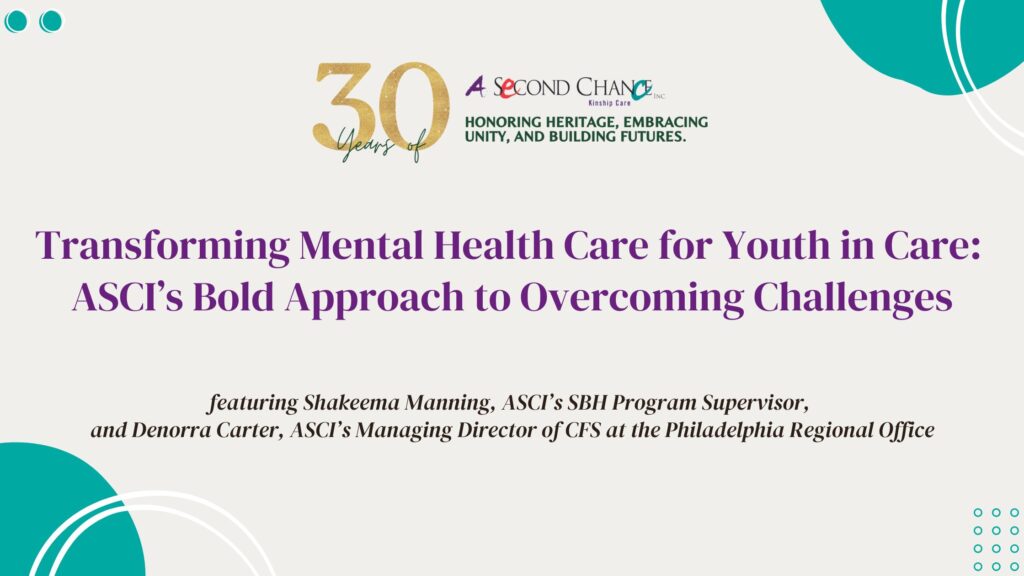Blog
Transforming Mental Health Care for Youth in Care: ASCI’s Bold Approach to Overcoming Challenges
In the complex field of mental health support for youth in care, Shakeema Manning, the Specialized Behavioral Health (SBH) program supervisor, and Denorra Carter, the Managing Director of Child and Family Services, at the Philadelphia Regional Office of A Second Chance, Inc., lead initiatives to tackle both significant challenges and transformative opportunities in providing comprehensive care.

ASCI offers a variety of mental health services to address diverse needs. Manning highlights essential resources, including individual therapy, the Children Crisis Treatment Center (CCTC) for therapeutic care, and institutions like St. Chris for issues such as eating disorders. Additionally, the Joseph J. Peters Institute (JJPI) provides specialized care for sexualized behaviors and abuse histories. At the same time, the Community Behavioral Health (CBH) board connects clients to services following referrals from agencies like Community Umbrella Agencies (CUA) or Department of Human Services (DHS).
Youth are able to get individual therapy. There’s also other therapy services like CCTC, which is a therapeutic nursery. There are also programs at St. Chris for kids with eating disorders or mental health issues. JJPI offers care for sexualized behaviors or histories of sexual abuse. CBH in Philadelphia links clients with appropriate services after referrals.
Shakeema Manning
However, accessing these services is challenging due to long waiting lists and a shortage of providers. Complicated referral processes and the need for parental consent—particularly when parental rights remain in place—further exacerbate delays. Older youth may also opt out of therapy or medication, which can worsen behavioral issues and complicate support efforts.

ASCI’s approach to addressing trauma and promoting resilience is multifaceted. The SBH department focuses on ongoing assessment and caregiver support, while initiatives like the tranquility corner and specialized training provide additional help.
We address trauma by first equipping our caregivers with the necessary tools to support the children effectively. This involves training in trauma identification and self-care, using models like STARTS. We emphasize the importance of understanding and breaking generational trauma to foster a healthier environment for the children.
Denorra Carter
Cultural competence is a core component of ASCI’s services. Programs like Sexual Orientation and Gender Identity/Expression (SOGIE) ensure providers respect diverse backgrounds, and support groups offer empowering spaces for youth. Collaboration among agencies is also crucial. The Resource Parent Support Plan, developed within 30 days, involves ASCI, CUA, and other stakeholders to create comprehensive support plans. Placement stability meetings and family group decision-making ensure that all parties, including birth families and child advocates, work together to meet the youth’s needs.
SOGIE training and support groups are crucial for cultural competence. For example, a transgender youth thrived with the support of a knowledgeable caregiver and therapist, highlighting the importance of inclusive and respectful care.
Shakeema Manning

Despite these efforts, gaps remain, such as provider shortages and difficulties in engaging some youth in services. Peer support programs like the DHS Youth Council Panel and the Achievement Independence Center (AIC) are essential in shaping mental health services and ensuring youth voices influence service delivery.
One of the significant gaps is the availability of providers. We sometimes face long wait times for evaluations and services due to a shortage of mental health professionals. Improving provider availability and streamlining evaluation processes could greatly enhance the support we offer.
Denorra Carter
As youth transition out of the care system, Carter and Manning emphasize preparing them for independent living programs that support life skills development and ongoing mental health management. Denorra Carter’s and Shakeema Manning’s leadership underscores ASCI’s commitment to delivering comprehensive, culturally sensitive, and collaborative mental health support, ensuring a successful transition into adulthood for youth in care.